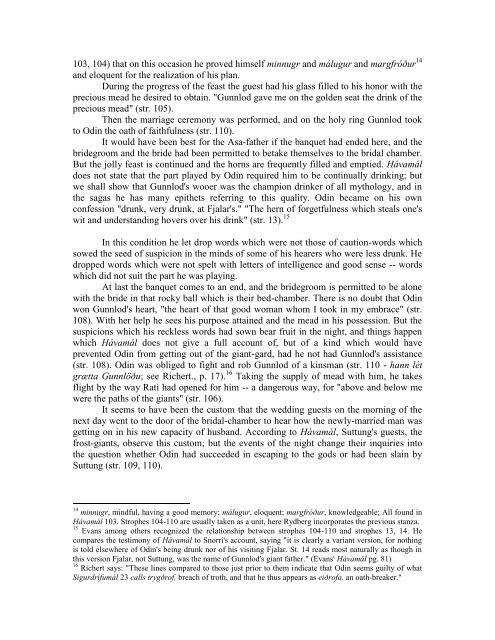Chapters 44-95 - Germanic Mythology
Chapters 44-95 - Germanic Mythology
Chapters 44-95 - Germanic Mythology
You also want an ePaper? Increase the reach of your titles
YUMPU automatically turns print PDFs into web optimized ePapers that Google loves.
103, 104) that on this occasion he proved himself minnugr and málugur and margfróður 14<br />
and eloquent for the realization of his plan.<br />
During the progress of the feast the guest had his glass filled to his honor with the<br />
precious mead he desired to obtain. "Gunnlod gave me on the golden seat the drink of the<br />
precious mead" (str. 105).<br />
Then the marriage ceremony was performed, and on the holy ring Gunnlod took<br />
to Odin the oath of faithfulness (str. 110).<br />
It would have been best for the Asa-father if the banquet had ended here, and the<br />
bridegroom and the bride had been permitted to betake themselves to the bridal chamber.<br />
But the jolly feast is continued and the horns are frequently filled and emptied. Hávamál<br />
does not state that the part played by Odin required him to be continually drinking; but<br />
we shall show that Gunnlod's wooer was the champion drinker of all mythology, and in<br />
the sagas he has many epithets referring to this quality. Odin became on his own<br />
confession "drunk, very drunk, at Fjalar's." "The hern of forgetfulness which steals one's<br />
wit and understanding hovers over his drink" (str. 13). 15<br />
In this condition he let drop words which were not those of caution-words which<br />
sowed the seed of suspicion in the minds of some of his hearers who were less drunk. He<br />
dropped words which were not spelt with letters of intelligence and good sense -- words<br />
which did not suit the part he was playing.<br />
At last the banquet comes to an end, and the bridegroom is permitted to be alone<br />
with the bride in that rocky ball which is their bed-chamber. There is no doubt that Odin<br />
won Gunnlod's heart, "the heart of that good woman whom I took in my embrace" (str.<br />
108). With her help he sees his purpose attained and the mead in his possession. But the<br />
suspicions which his reckless words had sown bear fruit in the night, and things happen<br />
which Hávamál does not give a full account of, but of a kind which would have<br />
prevented Odin from getting out of the giant-gard, had he not had Gunnlod's assistance<br />
(str. 108). Odin was obliged to fight and rob Gunnlod of a kinsman (str. 110 - hann lét<br />
grætta Gunnlöðu; see Richert., p. 17). 16 Taking the supply of mead with him, he takes<br />
flight by the way Rati had opened for him -- a dangerous way, for "above and below me<br />
were the paths of the giants" (str. 106).<br />
It seems to have been the custom that the wedding guests on the morning of the<br />
next day went to the door of the bridal-chamber to hear how the newly-married man was<br />
getting on in his new capacity of husband. According to Hávamál, Suttung's guests, the<br />
frost-giants, observe this custom; but the events of the night change their inquiries into<br />
the question whether Odin had succeeded in escaping to the gods or had been slain by<br />
Suttung (str. 109, 110).<br />
14 minnugr, mindful, having a good memory; málugur, eloquent; margfróður, knowledgeable; All found in<br />
Hávamál 103. Strophes 104-110 are usually taken as a unit, here Rydberg incorporates the previous stanza.<br />
15 Evans among others recognized the relationship between strophes 104-110 and strophes 13, 14. He<br />
compares the testimony of Hávamál to Snorri's account, saying "it is clearly a variant version, for nothing<br />
is told elsewhere of Odin's being drunk nor of his visiting Fjalar. St. 14 reads most naturally as though in<br />
this version Fjalar, not Suttung, was the name of Gunnlod's giant father." (Evans' Hávamál pg. 81)<br />
16 Richert says: "These lines compared to those just prior to them indicate that Odin seems guilty of what<br />
Sigurdrífumál 23 calls trygðrof, breach of troth, and that he thus appears as eiðrofa, an oath-breaker."
















